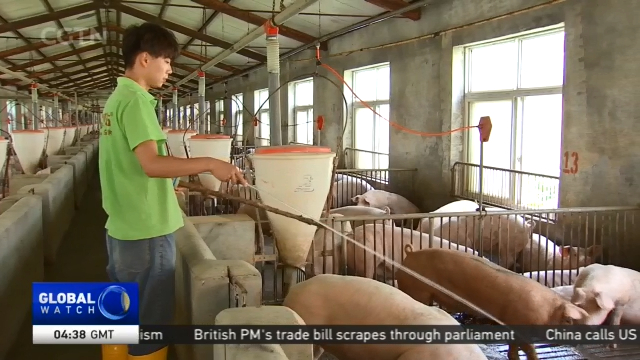
17:22, 18-Jul-2018
China-US Trade Frictions: Tariffs on soybeans create uncertainties for Chinese farmers
Updated
16:33, 21-Jul-2018
02:42

What impact is the trade tension having on Chinese agriculture? Our reporter, Xu Mengqi visited some farms in central China's Henan province to see how a reduction in soybean imports from the US was affecting their output.
If you are looking for actual bruises of the recent US-China trade friction, look no further than a pig farm. Soybean meals are an important part of pig's diet. And in China, many farmers get them from imported genetically-modified soybeans.
CAO WEI FARM OWNER "Domestically produced soybeans are pricier than the imported ones. Genetically-modified soybeans have a higher yield, whereas in China production is more dispersed."
Farm owner Cao Wei says he buys 1,000 tons of soybean meal a year to feed his 10,000 pigs. Recent price fluctuations cost him.
CAO WEI FARM OWNER "Since the tariff went into effect, there has been a 10% increase in the price of soybean meal. It went up from 2,900 yuan per ton to between 3,200 and 3,300."
XU MENGQI YONGCHENG, HENAN "Compared to other types of grain such as wheat, rice, and corn, soy has a considerably smaller amount of yield per acre. With limited arable land, and huge domestic demand, China has relied on imported soybeans for generations as a key ingredient in animal feeds and cooking oil."
But that may be changing. 10 km away from Cao Wei's farm, Liu Xinquan owns 660 acres of land, and he says 34 of it is for growing soybeans this year, a quarter more than the year before.
LIU XINQUAN FARM OWNER "This year the government rolled out subsidies, so we had more soybeans and less corn."
CHEN LIANYU, DEPUTY DIRECTOR AGRICULTURAL BUREAU OF HENAN'S YONGCHENG CITY "Because of the trade friction between China and the US and the tariff on imported soybeans, this April the State Council decided to expand almost 824,000 acres of soybean growing area in central China, and this is outside of the traditional prolific northeastern provinces."
The increased domestic production, however, will not meet China's demand just yet, as the nation will still rely on imported soybeans in the foreseeable future. Liu Xinquan says although he expected the price of domestic soybeans to go up, it actually went down somewhat, and there is no way to be sure about the price during the harvest. But as long as there are still subsidies, Liu says he will continue to grow soybeans. XMQ, CGTN, YONGCHENG, HENAN.

SITEMAP
Copyright © 2018 CGTN. Beijing ICP prepared NO.16065310-3
Copyright © 2018 CGTN. Beijing ICP prepared NO.16065310-3